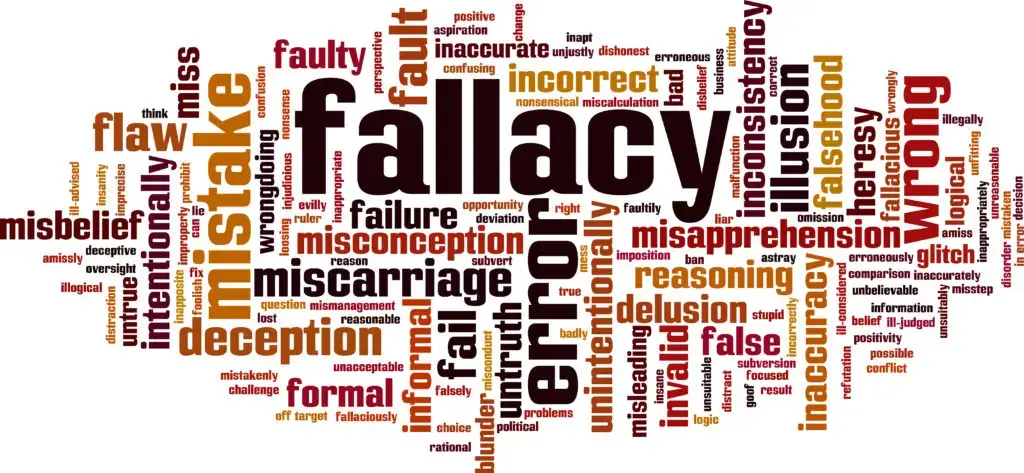What is a Logical Fallacy?
A logical fallacy can be described as flawed thinking:
Logical = Something based on reason and good judgement
Fallacy = A flaw in reasoning, a false or mistaken idea
Logical fallacies can either be unintentional or deliberate and they are errors in how we think. Logical fallacies are everywhere, in our personal conversations with others, in the media and in political rhetoric (speeches designed to influence people). We can learn to spot them in conversations with people who are being manipulative and with people who do not know how to think critically.
Logical fallacies are common in conversations and arguments with narcissists, so, to be armed with knowledge of them can help us to understand what is actually happening in the exchange.
When we learn to spot logical fallacies it is liberating. We can have a better understanding of the conversations we are having and what we are watching and reading in terms of the media.
There are some common examples of logical fallacies below. This is a short list and there are many more. Please see links to websites which address logical fallacies in a more in depth way at the end of this page.
Common Logical Fallacies
Ad Hominem
Ad Hominem is short for Argumentum ad hominem. This is Latin for ‘to the person’ or ‘argument against the person.’ Also known as the personal attack fallacy and poisoning the well.
This fallacy attacks the motives and character of either a person or a group with opposing views. Ideas and statements should be judged individually on their merit and not dismissed because of who they come from. Criticism should be focused on the ideas and not on the other person. It also makes assumptions about others such as, “Nigel doesn’t know anything because he votes for the conservatives/labour (etc.).
The Straw Man
The Straw Man is named after a straw man or a scarecrow and, therefore, it is a caricature of a person.
A person’s opinion is misrepresented or oversimplified in order to refute it more easily. Their words are twisted.
An American might say, “I am proud to be an American! USA!” Someone is not American may think/reply, “You Americans think you are better than everyone else,” but the American was not talking about anyone else’s country so his opinion was misrepresented.
The Sunk Cost Fallacy
The Sunk Cost Fallacy is named after the concept of ‘throwing good money after bad.’
A sunk cost is an expense that cannot be recovered by additional spending or investment.
When people have invested time and money into a person or project and they become aware that it would not be prudent to continue but the money they want to recoup drives them on to spend more. This keeps people in situations that are not good for them.
This fallacy is evident in fraudulent internet ‘dating’ or in Nigerian Prince scams when a person, the mark, has sent a lot of money to a fraudster and does not want to stop even when it becomes apparent the relationship is focused on money and is not genuine.
The Gambler's Fallacy
The Gamblers Fallacy can be readily seen in the world of gambling. It is an error in reasoning that leads to a person thinking that one outcome is more likely than another outcome.
A person makes false assumptions based on previous data in terms of what is going to happen next. For example, a person is gambling on American Roulette in a casino and they are betting on red or black. Red has come up 6 times in a row and there is the assumption that this must mean it is ‘black’s turn.’ This is a logical fallacy as the odds are always 50/50.
Whilst it is true that over time, data evens out, as in the case of male and female children for example, statistically there are 101 male children to 100 females, but, in each individual case we cannot predict the outcome.
Argumentum ad Populum
Argumentum ad Populum is Latin for Appeal to Popularity. Other names for this fallacy are: appeal to the majority and appeal to the masses.
This fallacy states that if an idea is popular it is credible or must be correct. A product or idea being popular does not give it credibility.
The Ford Puma car was the best selling car in the UK in 2024 so this must mean it is a good car. This does not logically follow. (The Ford Puma may be a good car – I know nothing about cars.)
The Slippery Slope Fallacy
The Slippery Slope Fallacy states that if ‘a’ happens,’ ‘b’ will follow.
One thing always leads to another. This fallacy is commonly used concerning drugs: if a person starts smoking the gateway drug marijuana, they will shortly be injecting heroin.
Appeal to Emotion
The fallacy of the Appeal to Emotion influences people via their emotions into agreement or into buying a product.
This is often seen in adverts. People look happy because of a product such as a razor, a cereal, an expensive phone or a car. Minimal information about the product is usually given.
People are influenced by the sleek visual images and ideas that they will be better looking if they shave with that razor, have happy kids if they buy that cereal and be admired if they have that expensive phone or car. A viewer may believe it will improve their ability to attract a partner.
Please also see the Transactional Analysis game – ‘Mine is Better Than Yours.’
Argumentum ad Novitatem
The Argumentum ad Novitatem means argument to newness, this is also known as the Appeal to Novelty or the Appeal to Progress Fallacy.
This states that if something is new it means it is good. It could be a new invention, a new technology or a ‘new improved‘ version of something. It is not stated why the product is good or better.
“New!” is commonly seen written on products. Many new inventions have been introduced, then accepted and widely used and have turned out to be harmful, such as asbestos, cigarettes, thalidomide, vapes and many more.
Argument from Repetition
The Argument from Repetition fallacy means an argument is repeated over and over. Also known as Argumentum ad Nauseam.
The repetition of an idea or opinion is repeated over and over rather than evidence being provided which supports the argument.
As Joseph Goebbels, the Nazi propagandist, is known for saying, “If you repeat a lie often enough, people will believe it, and you will even come to believe it yourself.”
This technique is often used in the political arena.
The Anecdotal Fallacy
The Anecdotal Fallacy occurs when someone uses a personal experience or isolated example to make a broad claim, ignoring more substantial evidence.
This fallacy often uses short stories to prove something to be true but, an isolated case of something being true which goes against the generally accepted wisdom, does not mean it is disproved.
Common examples are, “My grandmother smoked for 70 years and never got cancer and lived to be 90, so I don’t need to worry,” and, “I have never seen a happy marriage and therefore marriage is a bad idea.”
The Personal Incredulity fallacy
The Personal Incredulity fallacy states that something is too incredulous to be true.
A person is unable or unwilling to believe something to be true, “There is no way that Paul is dating Donna, he is much too good for her.”
The Texas Sharpshooter fallacy
The Texas Sharpshooter fallacy happens when data is used to build and prove a point.
The issue is that two things may be correlated but not caused by each other. An example of this would be, “a study showed that children start school in Sweden at age 7 and it is one of the happiest countries in the world.”
The Ambiguity Fallacy
The Ambiguity Fallacy means we may misunderstand something due to the statement being open to more than one interpretation.
A statement may be vague, unclear or the words can have multiple meanings. A statement may be intentionally ambiguous so that plausible deniability can be used at a later date if necessary.
The Black and White or All or Nothing Thinking Fallacy
The Black and White or All or Nothing Thinking Fallacy happens when we think in extremes. Things are all bad or all good.
The truth is usually grey rather than black or white but this fallacy does not allow for nuance.
An example we often see politically is the belief that, “If you are not with us then you are against us.” Go along with us or you are also the enemy.
Black and White Thinking is common for children of narcissists. Please see here.
The Appeal to Tradition Fallacy
The Appeal to Tradition Fallacy is the contrast to the Appeal to Novelty.
This is the belief that the old ways of doing things are better than new ways, “We need to do it this way as this is how it has always been done.”
Further Resources
There are many websites and books which explain the many logical fallacies in depth. Here are a few websites:
Logical Fallacies – List of Logical Fallacies with Examples
Appeal to Emotion – Definition and Examples – Logical Fallacy







